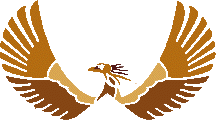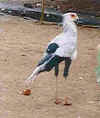


"Characterised in flight - the natural consequence of growth and speed. A powerful bird whose legs - depicted as the spear and knobkierie - serve it well in its hunt for snakes, symbolising protection of the nation against its enemies. It is a messenger of the heavens and conducts its grace upon the earth, in this sense it is a symbol of divine majesty. Its uplifted wings is an emblem of the ascendance of our nation, whilst simultaneously offering us its protection."
www.gov.za/symbols/coatofarms.htm
The Secretary Bird
Although the
blue crane is the national bird of South Africa, the secretary bird (Sagittarius serpentarius)
was chosen for our new Coat of Arms.
This
bird is found throughout Southern Africa and is fairly common. 
It has a grey top coat and is black underneath. Behind its head, it has about twelve long, loose black feathers projecting, which resemble the quills worn behind the ears of secretaries, in days gone by. Adults have orange coloured faces, whereas their young have yellow faces.
Its name (genus)
Sagittarius
was given it because of its  resemblance to an archer. The second
part or species, serpentarius refers to the bird's liking for
killing of snakes (serpents).
resemblance to an archer. The second
part or species, serpentarius refers to the bird's liking for
killing of snakes (serpents).
It is not a loud bird, in spite of its comical appearance, but it sometimes emits a frog-like croak. It is not generally seen in flight, since it prefers to wade in pairs through grassland, bushveld or thornveld and only flies when necessary. It is commonly seen running short distances with wings spread out.
It is said to prefer to roost
on top of thorn trees. The
eggs (usually two or three), incubate
between 45 – 50 days. The baby birds are born in intervals and the last born
usually dies of starvation, since it is not capable of competing with the
stronger, first-born birds.
The secretary bird eats lizards and tortoises, which are swallowed whole. Mice, grasshoppers, termites, the young of game birds and snakes make up the rest of their diet. They enjoy eating snakes and kill them by repeated pecking to the head. Whilst killing snakes, it spreads its wings half open like vultures, to ward off possible strikes by the snake. Since they are not immune to snake venom, they seem to instinctively make sure it is dead before eating it.